|
|
|
Sort Order |
|
|
|
Items / Page
|
|
|
|
|
|
|
| Srl | Item |
| 1 |
ID:
135096
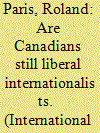

|
|
|
|
|
| Summary/Abstract |
Since coming into office in 2006, the government of Prime Minister Stephen Harper has rejected many of the symbols and practices of the liberal internationalist approach to foreign affairs that Canadian governments of all political stripes broadly embraced during the preceding six decades. As part of this change, the Harper government has also promoted a new narrative about Canada’s history and foreign policy, which encourages Canadians to change how they think about their country and its role in the world. By examining recent opinion surveys, this article asks whether Canadian public attitudes on foreign policy have shifted away from liberal internationalism and toward the Harper government's narrative since 2006.
|
|
|
|
|
|
|
|
|
|
|
|
|
|
|
|
| 2 |
ID:
121220
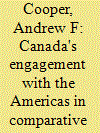

|
|
|
|
|
| Publication |
2012.
|
| Summary/Abstract |
Recent Canadian prime ministers have embraced the hemisphere of the
Americas, albeit in a differentiated and uneven fashion. Brian Mulroney
is commonly credited with "discovering" the Americas largely through
the decision to ?nally join the Organization of American States (OAS)
in 1989.1
Jean Chrétien pushed the "more amigos the better" approach
through support for the Free Trade Area of the Americas, the summit of
the Americas process, and the targeting of Team Canada activities in the region.2
|
|
|
|
|
|
|
|
|
|
|
|
|
|
|
|
| 3 |
ID:
106509
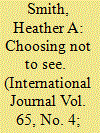

|
|
|
| 4 |
ID:
121183
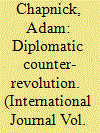

|
|
|
| 5 |
ID:
147846
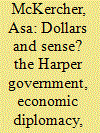

|
|
|
|
|
| Summary/Abstract |
Over its near-decade of governance, Canada’s Conservative government developed an international agenda that narrowly construed international engagement as economic diplomacy. Rooted in the Conservatives’ desire to establish themselves with voters as shrewd stewards of the Canadian economy, economic and commercial calculations took precedence, trumping even military spending and the Arctic, both defining portfolios for Prime Minister Stephen Harper. We demonstrate the economic essence of the Conservative government’s international agenda and examine outcomes related to trade, the extractive resource sector, and the Canada–US relationship. We argue that the dramatic overhaul of Canada’s public diplomacy, strategic and security agendas, and global cooperation initiatives was a result of a limited conception of foreign policy that prioritized economic and commercial objectives. The legacy of economic diplomacy is a renewed focus on the question of international engagement as a means to a Canadian end as a new Liberal government contends with the consequences of economic diplomacy.
|
|
|
|
|
|
|
|
|
|
|
|
|
|
|
|
| 6 |
ID:
146492
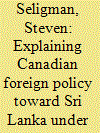

|
|
|
|
|
| Summary/Abstract |
Canada’s policy toward Sri Lanka underwent a significant shift following the end of the Sri Lankan Civil War in May 2009. Originally, the Harper government viewed Sri Lanka’s war with the Liberation Tigers of Tamil Eelam (LTTE) through the prism of the global war on terrorism. Canada listed the LTTE as a terrorist group and offered only mild and sporadic criticism of the Sri Lankan government’s human rights record. However, after winning a majority government in 2011, the Harper government has described itself as one of the world’s leading proponents of reform in Sri Lanka and has condemned the government of Sri Lanka in strong terms. This paper examines the Harper government’s foreign policy toward Sri Lanka and argues that electoral politics came to play an increasingly significant role.
|
|
|
|
|
|
|
|
|
|
|
|
|
|
|
|
| 7 |
ID:
121248
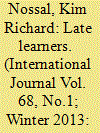

|
|
|
|
|
| Publication |
2013.
|
| Summary/Abstract |
Looking at the process that the Conservative government of Stephen Harper
tried to use to replace the Royal Canadian Air Force's aging CF-18 Hornet fleet
with 65 Lockheed Martin F-35 Lightning II Joint Strike Fighters, it is hard
to disagree with Andrew Coyne's assessment that the acquisition program
was "a fiasco from top to bottom, combining lapses of professional ethics,
ministerial responsibility and democratic accountability into one spectacular
illustration of how completely our system of government has gone to hell."1
For the evolution of Canada's participation in the F-35 program-from
the first memorandum of understanding (MOU) signed by the Liberal
government of Jean Chrétien on 2 January 1998 to the so-called "reset" of
the program in December 2012-readily fits the nouns the Canadian media
so commonly used to characterize the F-35 acquisition: fiasco, debacle, mess,
scandal, and shambles in English, or fiasco, scandale, incompétence, gâchis
(mess), gouffre financier ("money pit") in French.
|
|
|
|
|
|
|
|
|
|
|
|
|
|
|
|
| 8 |
ID:
122130
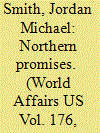

|
|
|
|
|
| Publication |
2013.
|
| Summary/Abstract |
"The nineteenth century was the century of the United States," Sir Wilfrid Laurier, Canada's prime minster from 1896 to 1911, stated midway through his term in office. He added his infamous prediction, "I think we can claim that it is Canada that shall fill the twentieth century."
|
|
|
|
|
|
|
|
|
|
|
|
|
|
|
|
| 9 |
ID:
143525
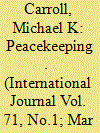

|
|
|
|
|
| Summary/Abstract |
For Canadians there has been a great mystique surrounding peacekeeping. The idea that Canada is—or perhaps more appropriately was—a peacekeeping nation par excellence resonates deeply. Yet, however good this myth has made Canadians feel about themselves and their international contributions, it has ultimately done a disservice, leading to unrealistic expectations about what Canada and the blue berets could accomplish on the world stage. Furthermore, Canada’s involvement in United Nations peacekeeping operations has not been motivated solely by altruism, but rather has been based on eminently practical factors of national self-interest. There is much that the Canadian Armed Forces has to offer the world in terms of future peace and security operations, but it remains to be seen whether peacekeeping factors into this equation.
|
|
|
|
|
|
|
|
|
|
|
|
|
|
|
|
| 10 |
ID:
115065
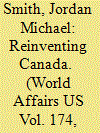

|
|
|
|
|
| Publication |
2012.
|
| Summary/Abstract |
The thin-haired, middle-aged man delivered a speech to the United Nations that undoubtedly left many in the international body fuming. He criticized Libya, Iran, and North Korea by name: "Just as fascism and communism were the great struggles of previous generations," he said, "terrorism is the great struggle of ours." He cited Winston Churchill and defended Israel. And he criticized the UN on its own turf. "The greatest enemies of the United Nations are those who quietly undermine its principles and, even worse, by those who sit idly, watching its slow decline."
|
|
|
|
|
|
|
|
|
|
|
|
|
|
|
|
| 11 |
ID:
160803
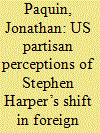

|
|
|
|
|
| Summary/Abstract |
While Stephen Harper’s foreign policy sparked heated debates during his entire tenure as prime minister, these debates were mainly confined to Canadian foreign policy circles. Little attention was paid to allies’ perceptions of these developments and, more specifically, to the perception of the United States, Canada’s main economic and security partner. How did the Bush and Obama administrations perceive these changes? Were they seen as a break from Canada’s past? Did Harper’s handling of foreign policy alter White House calculations with respect to Canada? Based on a series of semi-structured interviews conducted in Washington DC with executive officials a few months prior to the end of the Harper era in 2015, this essay shows that despite a widespread perception in Washington that Canada’s foreign policy approach had changed under Harper, partisanship was the main dividing line in terms of how this approach was perceived and assessed.
|
|
|
|
|
|
|
|
|
|
|
|
|
|
|
|
| 12 |
ID:
121215
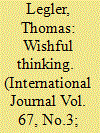

|
|
|
|
|
| Publication |
2012.
|
| Summary/Abstract |
Since the Mulroney government oriented Canada decisively toward
the Americas by joining the Organization of American States in 1990,
democracy promotion in the region has been an important activity, at least
rhetorically, of both Conservative and Liberal governments.1
This has never
been more so than with the present Conservative government of Prime
Minister Stephen Harper, who signaled early on that democracy support
would be both a key priority for its foreign policy and, more speci?cally, for
Canada's reengagement with the Americas.
|
|
|
|
|
|
|
|
|
|
|
|
|
|
|
|
|
|
|
|
|